If you want the best results for your business, then it’s important to understand and invest in SEO.
The best SEO tool that I’ll recommend is SEMrush.
SEMrush is a popular SEO tool that is proven and used by millions of online marketers, agencies, and SEO experts.
Instead of paying expensive SEO packages from agencies, try using SEMrush at a cheaper price.
The main reason why SEMrush is so good is because it’s an All in One SEO tool.
In other words, SEMrush has EVERYTHING YOU NEED to start drastically improving your SEO so you can get more traffic, sales, and delivering on your amazing services.
Best features of SEMrush:
- Keyword Research
- Backlink Checker
- Competitor Analysis
- Content Ideas Generation
- Site Audits
- Branded and White Label Reports
SEMrush is affordable and worth the money when you take into account all the features you have at your disposal.
The cheapest plan is the Pro Plan, which is $99 per month. You can get a free trial and cancel anytime.
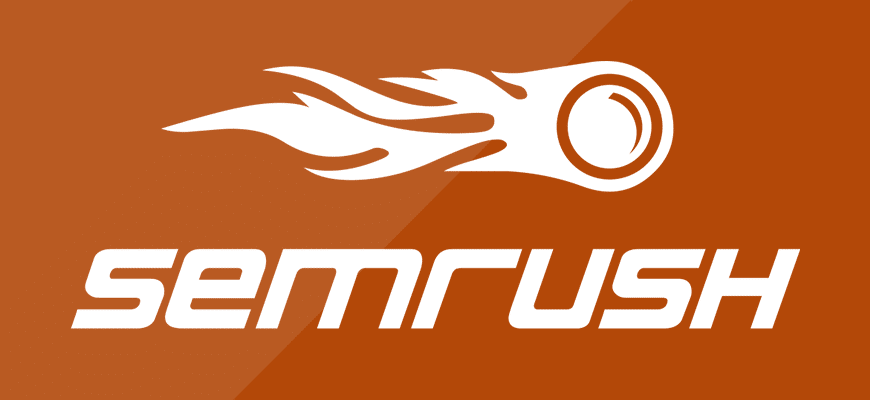
Click HERE to get a free trial of SEMrush and try a plan that best fits your business needs.
*Disclosure: The links on this page may give us a commission in order to run the website.
In this article, I’ll be discussing important SEO topics and key things you need to know that will help you GROW your business.
I’ll also talk more about how SEMrush can help you get the instant results you need for your business.
We’ll be covering:
I. How to Get Your Content to Stand Out
II. Helpful SEO Tips for Service or Product Based Businesses
III. Helpful SEO Tips for Local Businesses
IV. Strategies on Targetting Certain Keywords and Getting Traffic
V. Long Tailed Keywords
VI. Optimizing Metadata
VII. Knowing your Competitors and Competitor Analysis
VIII. Importance of Backlinks and How To Get Them
IX. Pay Per Click Advertising and Ad Campaigns
How Do I Get the Content for My Business To Stand Out?
Creating compelling content is very important when it comes to SEO.
This includes articles, videos, photos that provide quality information to your readers or customers.
This is why creating a blog to go along with your services can greatly benefit your business.
The key to blogging and content marketing is helping people find answers to their questions. This also means providing VALUE for your readers.
Have a good content strategy so you can position yourself as a thought leader in your field.
SEO For Service or Product Based Business
If you are providing a service or selling a product, then it’s vital that your content should help demonstrate why a customer should choose you or your product.
When it comes to content, write about your business, your business goals, why your customers need your product or why they should choose your services over somebody elses.
You could also discuss market developments or events that relate to your business.
Too many small business owners just put their products or services and contact details on their website and nothing else.
That’s not enough. It’s important to share your story and land an awesome first impression.
SEO For Local Businesses
If you are a local business, there are important things you need to do to improve your local rankings.
Make sure the name, address, and phone number of your business is on both your website and your Google My Business listing. Don’t forget to also include your website link in your listings too.
This is so Google can understand the relationship between your website and your business profile.
This means your business details will be visible when customers or clients try to find you.
If you don’t have a Google My Business account, make one.
Target Keywords and Drive Traffic To Your Business
It’s important to optimize your content and target the right keywords so search engines can give you traffic.
That’s why it’s called Search Engine Optimization (SEO).
But how do you make your site stand out and target the right keywords so you generate more sales?
You have to think about the words your clients or customers are likely to use when looking for your products or services on search engines.
For example, are your customers more likely to use a formal word like refrigerator or a slang word like fridge?
This is why it’s important to do your market research and know your audience.
Optimize your local business SEO by going after long-tail keywords. These keywords should be as specific as possible (more on long-tailed keywords later).
When you write your content, it’s important to be realistic about the chances of getting that content to rank #1 in search.
If you are in a competitive market, then it’ll be harder to get that number one spot but that’s okay.
Using a good SEO tool can help you greatly speed up the process of ranking.
Be patient, manage your expectations and just deliver great content.
Drive Quality Users Through Long-Tail Search
If you want to be successful when it comes to SEO, it’s important to target long tailed keywords so you can be visible in search queries.
Long tail keywords are those keyword phrases which are very, very specific to whatever you are selling.
Whenever a customer uses a highly specific search phrase, they tend to be looking for exactly what they are actually going to buy or looking engage in a particular service.
Targetting long tailed keywords is a good strategy because long tailed keywords have lower competition so you can rank for them and have them convert for you in a faster amount of time.
Long-tail queries sends about 70% traffic to websites and blogs.
This is perfect for business owners who don’t have big budgets.
For example, you could target queries, such as:
- Top rated handmade wristbands
- where to buy wristbands handmade
- Best Handmade wristbands under $40
- Cheap handcrafted wristbands to buy
Often times, it may be hard to find these long tailed keywords for your business.
If you want to find long tailed keywords faster and more efficiently, it’s better to use a SEO Tool.
Optimize Your Metadata With Right Keywords
This is something most business owners overlook when it comes to their website.
Every page on your website needs a unique meta description and title.
These are what you typically see in the Google search results.
Here are some key tips when it comes to metadata:
- Entice search engines users to click-through to your site.
- Contain your target keyword (optional—but recommended)
- Use only relevant, easy to rank, and helpful keyword phrases in your metadata (especially your title tag).
Here’s some things to avoid when it comes to metadata:
- Don’t stuff your metadata with too many keywords.
- Don’t exceed the length at which Google begins to truncate them in the search results.
- Avoid putting price or cost of your products in the metadata.
Categorize Your Pages
You don’t just want your ideal client or customer to visit your website and have difficulty understanding which category a particular page lives.
This is especially true when optimizing for local consumers.
Not only should you have your hours of operation, and listing the services that you cover, make sure that your pages are well categorized.
Search engines will not display a business that is not categorized. When you ignore or categorize your specific keywords wrongly, search engines may bypass your business. So this is very important.
You want to create a seamless navigation throughout your website or blog.
You can learn from top brands pages, and how Google crawls, indexes, and ranks specific pages based on the intent/purpose of that page.
Here’s an example from Starbucks organic listings:

Identify the exact search queries that your customer or client are typing into the search engines, then put them in the appropriate category.
It should be easy to navigate your site.
Your homepage should link to your other important pages (about, content, services).
Competitive Analysis is Key
So you target your long tailed keywords but how do you know your long tailed keywords are profitable?
You have test and analyze to make sure. Do NOT make assumptions. Assumptions can hurt your business.
The best way to know what’s working in your industry is to do a competitive analysis.
A competitive analysis is essentially an assessment of the strengths and weaknesses of your competitors website.
It provides the individual to identify opportunities and threats to their own website and allow for strategies to improve.
Doing a competitive analysis will allow you to see what’s working for your competitor and launch successful search campaigns that get you traffic, clicks, and sales.
When your able to pinpoint your competitor’s most profitable keywords, you could potentially gain a competitive edge in the search engine results.
3 benefits of conducting competitive keyword analysis:
- It allows you to steal your competitor’s most profitable keywords so that you can compete or complement the search results. At the end of the day, it all boils down to making the search users happy.
- Identify and optimize your content pages with trending keywords that majority of your competitors haven’t discovered yet.
- Gain unfair advantage over your competitor for broad keywords they thought were not important.
You will have to focus on niche keywords if you don’t have a big budget.
There are some plenty of SEO tools out there that can help you with a competitive analysis.
Click HERE for more in depth information on competitive analysis.
How Do I Get Quality Backlinks?
When a webpage links to any other page, it’s called a backlink.
Backlinks are important for ranking. A page with a lot of backlinks typically ranks higher better on Google.
So even if you have better quality content than some of your competitors when you are first starting your site, they still may rank higher than you because they have built more backlinks over a longer period of time.
The more sites that carry links to your site, the higher you will rank on searches.
But how do you get backlinks?
Ask the owners of related sites to carry a link to your site. Offer to carry a link to theirs in exchange for a link to yours.
Focus on the quality of the links. For example, one link directing to your website from a chamber of commerce or a university website will help you more than a dozen links from obscure website.
It’s also important that you get backlinks to sites related to your industry.
Another good way to build backlinks is to do a guest post. Create some form of content for another website.
You can also ask for links from related businesses with whom you have existing relationships—e.g., suppliers, stockists, etc.
Getting links to your business site is an important part of local SEO.
Exactly where to get links can differ in every industry. However if you are local business, focus on getting backlinks in places like Yelp, Bing Places, Yahoo! Local, Apple Maps, and more.
If your small business is closely related to other businesses that are not located in the same area, you should definitely also ask those businesses for a link. Google spiders the web link by link, so if your business is linked to from a website in the same field of business, that link is extra valuable to you.
Remember to use analytic tools like Google Analytics that will provide you with more information on the SEO performance of your site and tell you more about your visitors—how they found your site (search engine, referring website, etc.), their geographical location and how long they stayed on each page.
Pay Per Click Advertising
If you want instant results and have a bigger budget, then it’s a good idea to look into Pay Per Click Advertising and run ad campaigns.
Pay Per Click (PPC) Advertising is where an ad for your business appears above or beside the free search results. You essentially pay the search engine like Google each time your link is clicked.
PPC delivers quick results at a cost and a good option if you have extra cash and don’t want to wait to rank for keywords, which takes time.
PPC is great for brand awareness but it can get expensive, especially if you are competing for ads in a competitive market.
When your organic visibility starts to build, you can look at dialing back you paid search campaign.
The best approach is usually PPC and traditional SEO which delivers the best results in many cases.
[convertkit form=1624274]
The Best SEO Tool For Your Business

SEMrush is an incredibly helpful SEO tool that will help you improve your visibility online, discover most of your competitors, and improve SEO by boosting your rankings.
Click HERE to learn more about SEMrush’s great features.
SEMRush can help address many of the challenges that comes with SEO and improving your rankings.
Here are 5 ways SEMrush can help your business:
1. SEMrush Helps Optimize Content and Recommends Ideas
Creating compelling content can be hard but it doesn’t have to be.
SEMrush provides you ways you can optimize the content on your pages and even gives you recommendations of ideas and template.
You can submit a keyword and get a template of how you can use that keyword.
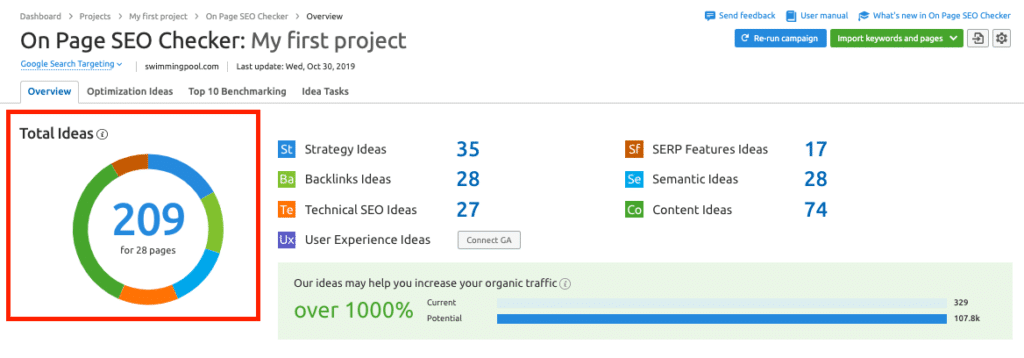
2. SEMrush Helps Find All the Keywords You Need
It can be long and tedious trying to rank for profitable keywords.
Luckily, SEMrush has something called the Keyword Magic Tool to do the bulk of your keyword research and find various keywords related to your industry.
This entire process can help you find new low-cost and low-competition keywords that you can capitalize on and start stealing traffic from your competition.
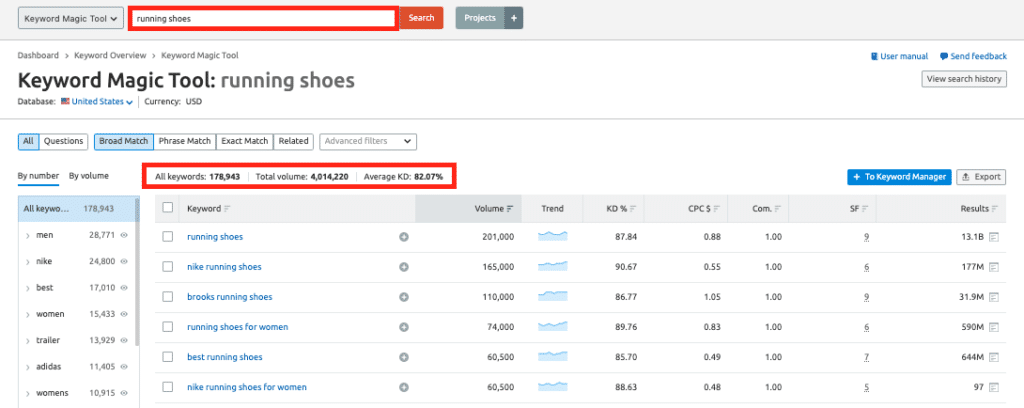
Finding the right keywords can save you time and money.
3. SEMrush is the Best Tool For Competitive Analysis
It’s important to find out who competes with you not only in your industry, but any website that is outranking you for your target keywords.
The reason why SEMrush is the best SEO tool for a competitive site analysis is because it specializes in competitor data.
SEMrush instantly gives you a list of your competitors when you type in a domain and can give you a side by side comparison of your competitors.
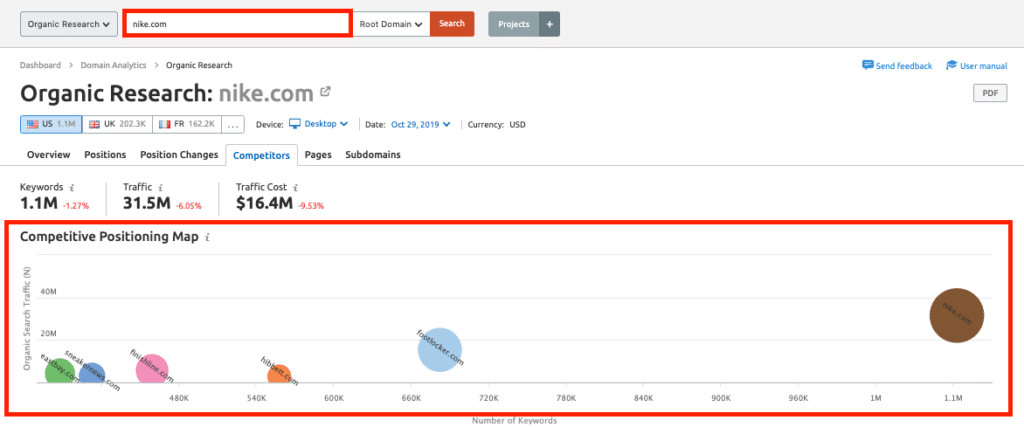
4. SEMrush is a Good Way To See Backlinks
You can see the backlinks of your site or you competitor’s site.
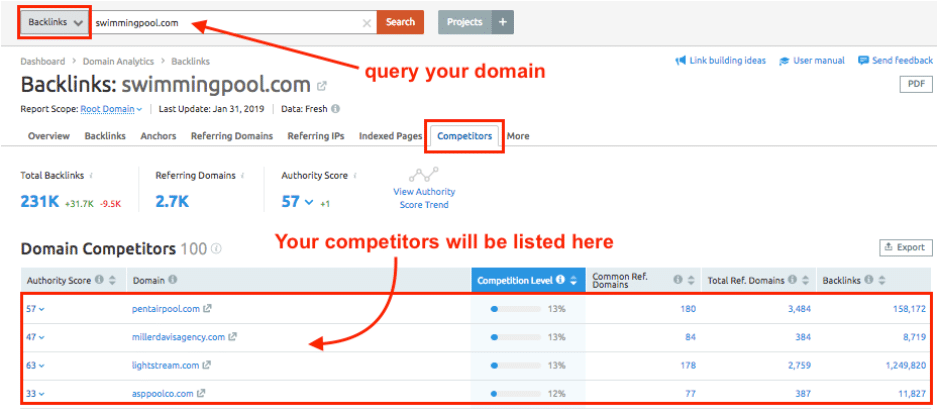
5. SEMrush Lets You See Your
Competitor’s Google Ad Campaigns
It’s important to see your competitors Google Ads because they can help improve your own campaigns if you choose to do Pay Per Click advertising.

Sign up HERE for a FREE SEMrush trial
There are three plans. Find a trial plan that best fits your business needs.
After you get your free trial, Click HERE to get EASY step by step instructions on how to effectively use SEMrush and hit the ground running.
For more post like this, check out:
Best SEO Tool For Competitor Site Analysis
Best SEO Software For White Label Reports
Don’t forget to subscribe to get more FREE tips on using SEMrush and other services that can help grow your business!
[convertkit form=1548253]


Be First to Comment